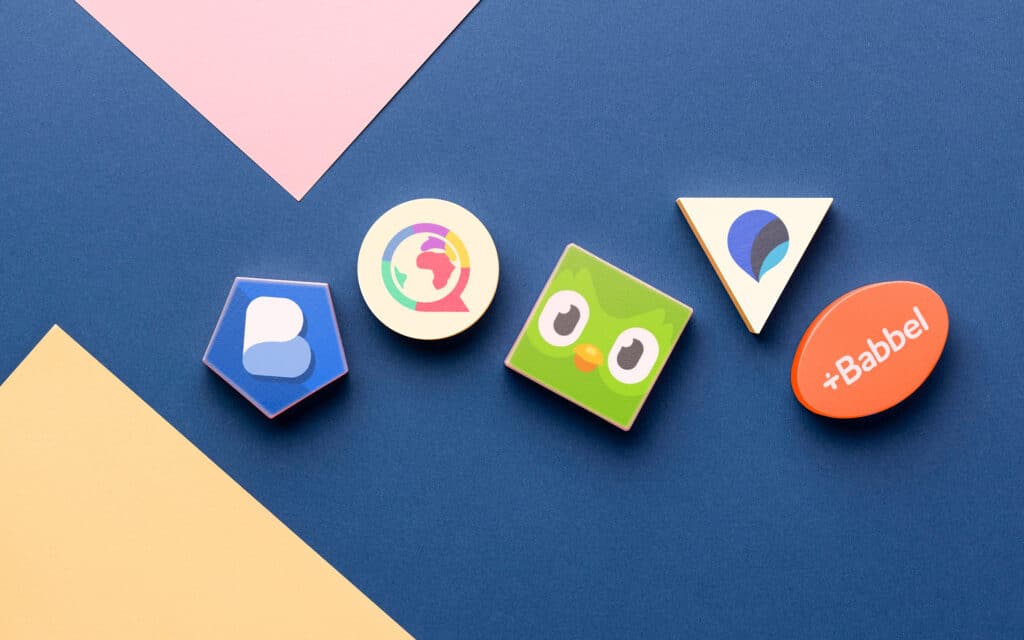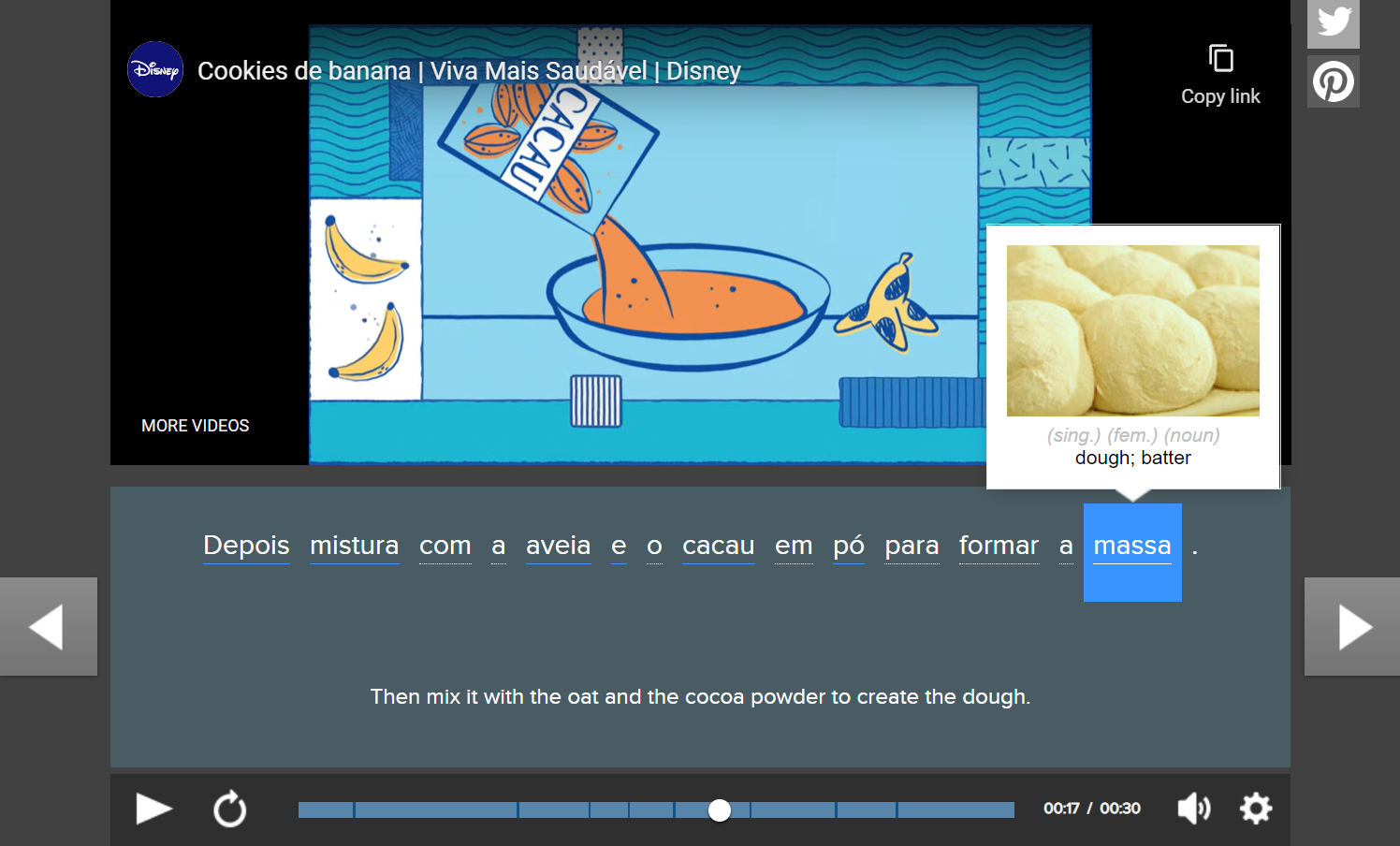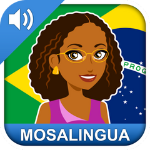
10 Best Apps to Learn Portuguese in 2024 (Vocabulary, Listening Practice and More)
Language learning apps give you easy access to Portuguese learning experiences. You can pull them out in those otherwise lost moments when you’re in a line or on the bus.
But which apps are the best?
Well, the best app to learn Portuguese will be different for different people, but these are the ones that truly stood out in my tests and should be considered for a place in any Portuguese learner’s pocket.
I’ve even labeled them with their best features and who they’ll be most suited for, so keep reading for the 10 best Portuguese learning apps out there right now.
Contents
- 1. Best All-in-one App: Busuu
- 2. Best Immersive App: FluentU
- 3. Best Flashcard App: Anki
- 4. Best App for Busy Learners: Duolingo
- 5. Best App for Listening and Speaking: Pimsleur
- 6. Best App for Reading Practice: Readlang
- 7. Best App for Beginners: Babbel
- 8. Best App for Intermediate Learners: Clozemaster
- 9. Best Dictionary App: WordReference
- 10. Best App for Travelers: MosaLingua
Download: This blog post is available as a convenient and portable PDF that you can take anywhere. Click here to get a copy. (Download)
1. Best All-in-one App: Busuu
Pricing: Free limited access; paid premium version
Busuu has a cheerful interface that’s meant to keep you coming back for continual improvement.
The app focuses on 150 important, basic topics, and you advance through a variety of levels.
You learn vocabulary from generic pictures (not particularly designed to show you Portuguese cultures), so it’s best to follow up with some practice with native speakers to ensure that you get exposure to Lusophone ways of experiencing the vocabulary.
Fortunately, there is some interactive functionality included in the app—you can submit practice exercises and get messages from native Brazilians and Portuguese people who will correct and respond to your work.
See our full review of Busuu here.
2. Best Immersive App: FluentU
Pricing: Paid subscription; free trial available
FluentU uses real media made by and for Portuguese speakers, paired with learning tools to help you understand everything that’s being said.
Consuming native materials will help you make progress in the language, but these can be hard to find and often involve unfamiliar accents, fast speech and slang.
To solve those problems, the FluentU program comes with a curated video library as well as interactive subtitles, downloadable transcripts, multimedia flashcards and other handy features.
When watching a video, you can hover over any word to see an in-context definition, image and grammar notes. A tap will give you example sentences, audio pronunciation and other video clips that feature the term.
Alternatively, FluentU also functions as a video dictionary that can show you all the information above when you search for a specific term.
You can even test your new vocab knowledge with FluentU’s flashcard practice and personalized quizzes that challenge all language skills, including speaking.
3. Best Flashcard App: Anki
Pricing: Free for web and Android; one-time fee for iOS
There’s something lovely and useful about the tactile feel of flashcards, but I gave them up long ago for this app.
Anki’s two key advantages over physical flashcards are that you can save audio (you can record a language partner or teacher) and it’s easier to keep with you, so you’re likely to practice more often.
There are dozens of user-submitted Portuguese decks available covering common phrases and verb conjugations, but I strongly urge you to make your own. You can make them on a computer and synchronize them with your smartphone, or just make them in the app itself.
As with paper, the act of thinking about what you want to remember and then actually making the card often gets you halfway towards memorization by itself. Also, the quality of other users’ decks can vary and thus could contain errors.
See our tips and tricks for learning a language with Anki here.
4. Best App for Busy Learners: Duolingo
Pricing: Free; paid premium version
Duolingo can be a good way to build vocabulary, especially when used alongside other language learning methods.
Once you determine your Portuguese level, you take on units that are designed around different themes, such as education and work. The focus is not on grammar, but rather on learning nouns, adjectives, verbs and tenses that allow you to communicate around the given topic.
Exercises include voice recording (listening to a sentence and then reading it out loud yourself), translation of phrases, matching photos to words, rearranging words to form sentences and answering multiple-choice questions.
The app is designed to be cheerful and the sections are short so you can always fit in a quick session during any brief spare moments.
See our full review of Duolingo here.
5. Best App for Listening and Speaking: Pimsleur
Pricing: Paid subscriptions; free trial available
This app puts emphasis on listening and speaking skills with an audio-based Portuguese course.
Each Pimsleur lesson is 30 minutes long, and they cover a variety of useful topics in order to expose you to what real Portuguese conversations should sound like.
Interactive activities help you work on pronunciation and speaking confidence. Pimsleur also uses their version of the spaced repetition system to help you learn—and remember—essential words and phrases.
Though it doesn’t offer much in terms of explicit grammar instruction, reading practice or writing skills, this app aims to get you having successful conversations in Portuguese. In this way, it’s a good supplement to language tools that focus on the previously mentioned skills.
See our full review of Pimsleur here.
6. Best App for Reading Practice: Readlang
Pricing: Free limited access; paid premium subscription
This immersion tool allows you to read texts in Portuguese and get instant, seamless translations by clicking on any words or groups of words that you don’t know.
When you’re done reading, Readlang remembers the words you checked and includes them as flashcards for you to practice afterward, complete with their original context.
Reading material is entirely up to you, though Readlang offers an integrated library that features an interesting collection of public texts. You can also upload your own texts if they’re in plain text or .epub format (convert them for free using Calibre).
Note that although Readlang doesn’t have dedicated apps, it was designed with smartphones and tablets in mind—the devs have provided instructions for iOS devices and Android devices so that you can still use Readlang exactly like a proper app.
7. Best App for Beginners: Babbel
Pricing: Paid subscriptions
This app combines visual, auditory and interactive elements to teach users Portuguese.
Babbel claims to support a variety of levels, though material for intermediate learners and above is limited. The focus on real-life conversations and practical vocabulary is ideal for beginners, however.
One of the pros of this app, in my opinion, are the grammar and language use tips. While you won’t get full-blown grammar lessons, these offer helpful information that many other apps don’t.
Babbel also builds upon previous lessons. As you advance through the app’s program, you’ll continue to see words and phrases you learned previously in order to keep them fresh in your mind.
While the primary focus is on language skills, the app also integrates cultural insights and related, contextual vocabulary.
See our full review of Babbel here.
8. Best App for Intermediate Learners: Clozemaster
Pricing: Free limited access; paid premium subscription
Among a plethora of Portuguese resources geared towards beginners, Clozemaster is a deus ex machina for intermediate and advanced learners.
It has an interactive, gamified approach to reinforcing your vocabulary in context by going through sentences and filling in missing words (clozes).
The sentences are extracted from film and TV subtitles provided by Tatoeba, which ensures great variety as far as dialects and vocab, with a great dose of authenticity as far as phrasing.
Clozemaster has over 100 language pairings (native language to target language), and the Portuguese-from-English pair comes with a whopping 94,000+ sentences to play with.
See our full review of Clozemaster here.
9. Best Dictionary App: WordReference
Pricing: Free
Any serious Portuguese learner should have a good dictionary. If you’re going to choose just one Portuguese dictionary app, I recommend this one.
Whether you’re chatting over a caipirinha in Copacabana or trying to decipher samba rock lyrics, WordReference is going to give you pretty complete coverage of even the wildest corners of the Portuguese lexicon.
The most interesting feature to me is the English-Portuguese forum, which is an option at the bottom of any look-up you make in the app.
There, you can ask about both the dignified Portuguese that has somehow escaped dictionary editors’ attentions, as well as the coarse neologisms that they don’t deign to acknowledge. (My own near-decade of contributions to the forum tends towards the later, I’m afraid!)
The app can also conjugate any Portuguese verb, and gives sometimes-useful links to Google image searches at the bottom of entries.
10. Best App for Travelers: MosaLingua
Pricing: Paid subscriptions; free trial available
If you’re more of the traveling type (as opposed to the super serious studier), this is likely the app for you.
Select what type of Portuguese words and phrases you want to learn (for travel, work, passing a language exam, etc.), and then MosaLingua will teach you the language you need, mostly with flashcard exercises.
There are multiple ways to study each flashcard, and MosaLingua uses spaced repetition like a few of our other apps, so even in more advanced levels, you’ll be reminded of what you learned earlier on.
MosaLingua started as a flashcard app, and though that’s still the main focus, you can now also find dialogues and reading activities, as well as conjugation explanations, grammar lessons and pronunciation practice.
Even if you have no immediate travel plans, this app can help you advance your Portuguese skills—and it can do so with the hands-free mode, if you’re on the go.
Note that MosaLingua is primarily focused on Brazilian Portuguese. You can see more learning apps specifically for Brazilian Portuguese here.
You can also see our full MosaLingua review here.
The best app to learn Portuguese will foster the kind of smartphone addiction that will actually improve your mind—and your interactions in real life.
If you’ve got even one of these apps in your pocket, I’m confident that you’ll be on a quick route to better Portuguese.
Download: This blog post is available as a convenient and portable PDF that you can take anywhere. Click here to get a copy. (Download)













